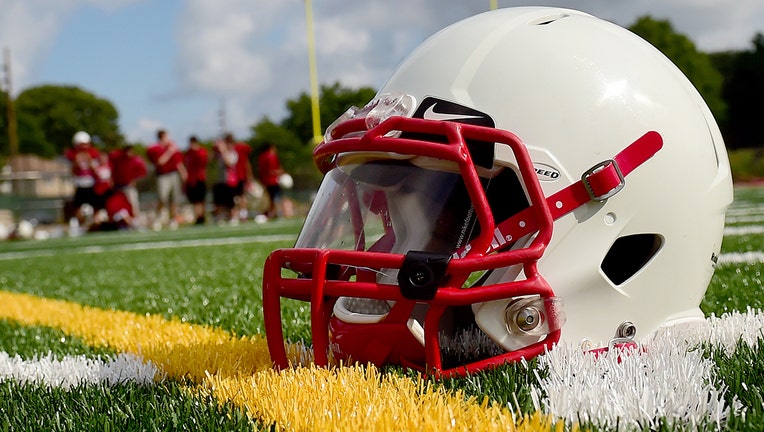Youth tackle football: Americans differ on whether kids should play, survey finds

A football helmet lies on the ground while members of the Floral Park High School football team are in the background practicing for the 2015 season, on the morning of August 19, 2015.(Photo by Thomas A. Ferrara/Newsday via Getty Images)
COLUMBUS, Ohio - Youth tackle football has become a particularly controversial topic due to the mix of benefits and risks it offers — and a new study proves just how divided America is on the subject.
"Football plays a prominent role in American culture," a co-author wrote. "This study analyzes public opinion about the appropriateness of children playing tackle football."
Researchers at Ohio State University surveyed nearly 4,000 adults and asked them to rate on a scale of 1 (strongly disagree) to 4 (strongly agree) the statement: "Tackle football is an appropriate sport for kids to play."
Participants, who live in all 50 states, answered the survey online between the fall of 2018 and spring of 2019.
The survey, published in Social Currents on March 26, found about 45% of Americans agreed that tackle football was appropriate for kids, while 50% disagreed. The remaining 5% did not know.
During the process, the team also examined how adults’ social structural locations, ideologies and group affiliations, and sport-related values were associated with beliefs about the appropriateness of youth tackle football.
The researchers found that those identifying as male and heterosexual, along with those with traditionalist ideologies and group affiliations encouraged support for football. Support was also elevated among those who were non-white and less educated.
Meanwhile, higher-income adults were more likely to not support youth tackle. And, people in rural areas were more supportive of the sport than those in the suburbs.
In addition, beliefs in the value of sport and immersions within football cultures and interactions seemed to enhance support for children playing tackle football.
"Our results indicate that there is substantial disagreement about the appropriateness of youth tackle football and that social forces are important in justifying and problematizing the (re)construction of it," the authors continued.
The findings come as participation in youth tackle has declined with growing concern about the effects of concussions on young brains, a news release based on the study noted, adding that the largest decrease in participation has been among children ages 6 to 12, who showed more than a 20% decline from 2008 to 2018.
Brett Favre on kids tackle football
Last year, Pro Football Hall of Fame quarterback Brett Favre told parents to wait until their children were 14 years old to play tackle football. The former Green Bay Packers legend released a powerful public service announcement in a "TODAY" exclusive in partnership with the Concussion Legacy Foundation.
According to the PSA, the longer a child plays tackle football, the more likely they are to develop chronic traumatic encephalopathy (CTE). Favre, who spent 19 seasons in the NFL, told "TODAY" that he may have experienced brain injuries during his playing days.
According to a joint study by the U.S. Department of Veterans Affairs, Boston University and the Concussion Legacy Foundation Brain Bank, 25% of high school football players developed the brain disease. There was CTE in 16 of 65 high school football players, and only one of the 16 players started playing tackle football after 14 years old.
Chris Nowinski, co-founder and CEO of the foundation, released a statement saying that children who play tackle football are more likely to develop the disease.
"A football player’s odds of developing CTE may be most determined by their parents, specifically what age the child is allowed to start playing tackle football," Nowinski said. "It’s time to accept that CTE is not just a risk for professional and college football players, but also for high school players, and the best way to prevent CTE among football players is to delay the introduction of tackle football."
Lawmakers announce bills to prevent tackle football
Last year, a California bill called the California Youth Football Act was signed into law by Gov. Gavin Newsom that would not prevent tackle football, but rather established new safety standards.
The bill prohibits a youth tackle football team from conducting more than two full-contact practices per week during the preseason and regular season.
In 2015, the NFL acknowledged a link between head blows and brain disease and agreed in 2015 to a $1 billion settlement with former players.
RELATED: Brett Favre says children under 14 years old shouldn't play tackle football
Also last year, USA Football, the national governing body for amateur American football in the U.S. and a member of the U.S. Olympic and Paralympic Committee (USOPC), received support from two leading sports medicine organizations on USA Football’s eight recommendations for youth tackle football.
The American Medical Society for Sports Medicine (AMSSM) and the Sports Neuropsychology Society (SNS) both publicly expressed support for USA Football’s eight recommendations for youth tackle football.
Some of USA Football’s recommendations, first instituted in March, include strictly defining the levels of contact and limiting the time spent conducting full contact in preseason and regular-season practices; prohibiting certain drills, like the Oklahoma drill; and recommending the use of the two-point stance.
"Education is a primary pillar of our mission, which changes behavior for the better for athletes at every age," Dr. Jason Matuszak, an AMSSM board member, said in a news release. "The forward-thinking and care exhibited by USA Football are what every leader in athletics – especially in children’s sports – would do well to emulate. The AMSSM enthusiastically affirms these recommendations for youth football play."
FOX News contributed to this story.


